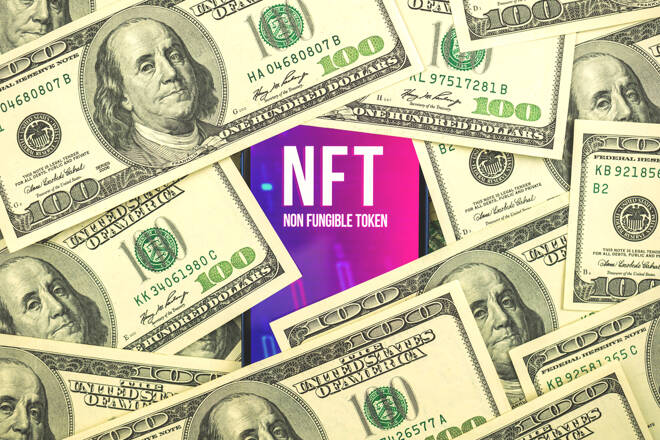Advertisement
Advertisement
Messenger App LINE Launches LINE NFT Amidst Regulatory Uncertainty
By:
The messaging app LINE next plans to launch a global NFT marketplace in the summer. Increased activity may draw greater regulator scrutiny, however.
Key Insights:
- This week, messenger app LINE launched its own NFT marketplace with about 40,000 NFTs for sale.
- As the NFT space grows, regulatory scrutiny will likely intensify, which may affect NFT growth.
- Increased competition could also lead to a fragmented NFT market, leaving marketplaces more vulnerable to illicit activity.
2022 has seen the news wires flooded with NFT and Metaverse chatter, as mainstream players go Web3.
While NFTs and the Metaverse gain traction, regulatory uncertainty shrouds the ever-expanding world of digital assets.
Despite the ongoing regulatory uncertainty and issues over the classification of NFTs in some jurisdictions, messenger app LINE goes NFT.
Japan and South Korea Messenger App LINE Launch NFT Marketplace
On Wednesday, LINE announced the launch of LINE NFT, an NFT marketplace in Japan. LINE launched LINE NFT through LVC Corporation, which runs LINE’s crypto and blockchain businesses.
According to the announcement,
“A non-fungible token (NFT) marketplace available only in Japan, LINE NFT will offer a wide variety of content, including exclusive NFT videos by Yoshimoto Kogyo Holdings Co. Ltd. Called Yoshimoto NFT Theater, NFTs from classic anime series Patlabor the Mobile Police, and NFTs of other popular characters.”
LINE NFT users can buy and trade NFTs and store their purchased NFTs in their LINE BITMAX Wallet. Holders of LINE NFTs can send or exchange NFTs with their LINE friends.
LINE NFT will initially offer around 40,000 NFT products.
According to LINE, there are approximately 90 million users in Japan.
Regulatory Uncertainty Could Test LINE’s Global Expansion Goals
In Japan, there is currently no law that regulates NFTs. Crypto assets, including Bitcoin (BTC), are considered electronically recorded property values, transferrable through electronic processing platforms, and usable as a means of payment.
By contrast, NFTs do not serve a similar economic function and cannot be considered crypto assets.
Until there are clear guidelines on the classification of NFTs, there remains a risk of unpredictable regulatory action.
The launch of LINE NFT may raise the eyebrows of a few lawmakers, especially when considering the demographics of LINE users in Japan.
NFTs also fall into a grey area in the U.S, vis-à-vis regulatory oversight. As a result of the regulatory uncertainty, platforms may fall foul of regulators.
This week, virtual casino Sands Vegas Casino Club received a cease-desist order for selling NFTs to fund operations. According to the state laws of Alabama and Texas, the NFTs constituted an illegal securities offering.
Sands Vegas Casino sells NFTs on the OpenSea marketplace. NFT sales revenue funds the development of metaverse casinos. Casinos are targeting popular metaverses, including the Sandbox (SAND), Decentraland (MANA), Infinity Void, and NFT Worlds.
News of the cease-and-desist orders comes as Coinbase prepares to launch CoinbaseNFT.
Regulatory scrutiny will likely intensify when considering the current rise in the number of NFT marketplaces.
For leading NFT marketplaces such as OpenSea, a more competitive playing field could eat further into trading volumes.
OpenSea Trading Volumes See Downward Trend Since January Peak
Since a January peak, leading NFT marketplaces have seen trading volumes plummet. This month, FX Empire reported OpenSea trading volumes falling for a second consecutive month in March.
Increased competition will further impact trading volumes, as will any shift in the regulatory landscape.
The emergence of new marketplaces will force OpenSea and other established NFT marketplaces to expand offerings, which may also draw greater regulatory scrutiny.
This year, the surge in NFT trading activity and the rise in illicit activity drew the attention of UK lawmakers. British members of Parliament reportedly called on the government to impose tougher regulations on cryptos and NFTs.
The U.S government has also taken a similar stance, with Joe Biden signing an Executive Order to tackle the digital asset space.
About the Author
Bob Masonauthor
With over 28 years of experience in the financial industry, Bob has worked with various global rating agencies and multinational banks. Currently he is covering currencies, commodities, alternative asset classes and global equities, focusing mostly on European and Asian markets.
Advertisement
